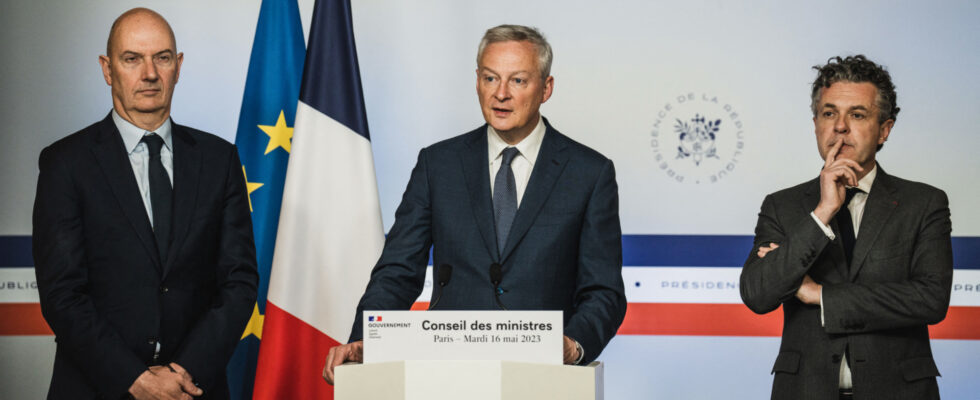Margaux Fodéré with AFP / Photo credits: Xose Bouzas / Hans Lucas / Hans Lucas via AFP
The government went on the offensive on Tuesday on the “industrial reconquest” of France, presenting its bill intended to promote a low-carbon reindustrialization of the country, its main battle after the painful pension crisis. Tax credit, reduction in authorization periods, turnkey industrial sites… The Minister of Economy and Finance, Bruno Le Maire, detailed the content of the text, the key measures of which had already been unveiled by the President Emmanuel Macron, engaged for several days in a sequence praising the attractiveness and the reindustrialization of the country.
Reverse half a century of deindustrialization
Hoping to regain momentum after the difficult pension reform, the executive wants to reverse half a century of deindustrialization in France. “It is with the political will that we can succeed in industrial reconquest, with one objective (…): to make France the largest low-carbon power in Europe”, declared Bruno Le Maire to the press before presenting the Green Industry Bill in the Council of Ministers.
Referring to 300 net factory creations since 2017, he specified that the objective was to accelerate the movement: to raise the share of industry to 15% of national wealth in the coming years, against around 10% currently, a proportion halved in fifty years.
The five favored green technologies
Five green technologies will be favored for the creation of new sectors (green hydrogen, batteries, wind power, heat pumps, photovoltaics), while greening the existing industry. The new establishments of industrial sites will be encouraged thanks to a shortening, by dividing them by two, of the authorization procedures, to nine months maximum. While land is scarce, one billion euros is planned to clean up wasteland, with the aim of preparing 50 pre-developed turnkey sites.
For “projects of major national interest” such as gigafactories, the State will take control by decree of all the procedures. The ecological bonus for the purchase of an electric car will be reformed to take into account the carbon footprint of their production in Europe. In response to the very proactive policy of the American “Inflation Reduction Act”, as well as to the rise of Chinese power, a “green industry tax credit” will aim to attract industrial investment in batteries, heat pumps , wind turbines and solar panels – not hydrogen which already enjoys specific support. “The battle is with a knife between China, the United States, Europe, no one is making a gift”, warned Bruno Le Maire.
Decarbonization subsidies for existing industries
This tax credit will cover 20% to 45% of the investments made, taking advantage of a recent relaxation of European state aid rules for green technologies. The government hopes for some 23 billion euros in investment by 2030 and the creation of 40,000 direct jobs. The cost of this system is estimated at 500 million euros annually, offset in particular by removing the ceiling from the penalty on polluting vehicles, the greening of the company fleet or a limitation of so-called “brown” expenditure in favor of fossil fuels, which will be debated within the framework of the next finance law in the autumn.
The bill also provides for decarbonization subsidies for existing industries, up to 2.3 billion euros in direct loans or guarantees by Bpifrance, while 700 million euros will go to training. However, the government wants the measures in favor of the green industry to be made at zero cost for the public finances in bad shape, which it is committed to redressing over the next few years.
In addition to public funds, it thus intends to mobilize up to 5 billion euros annually in private savings via a “future climate savings plan” for minors, the annual collection of which could reach one billion euros. PER and life insurance will also have to be partly devoted to green investment.
In total, the bill would reduce the French carbon footprint by 41 million tonnes of CO2 by 2030, or 1% of the total. He will begin his parliamentary career in the Senate on June 19 and then on July 17 in the National Assembly, where the presidential camp, without an absolute majority, will have to convince beyond its benches. The NGO Climate Action Network called on Parliament “to strengthen the text, which is too timid as it stands”.
